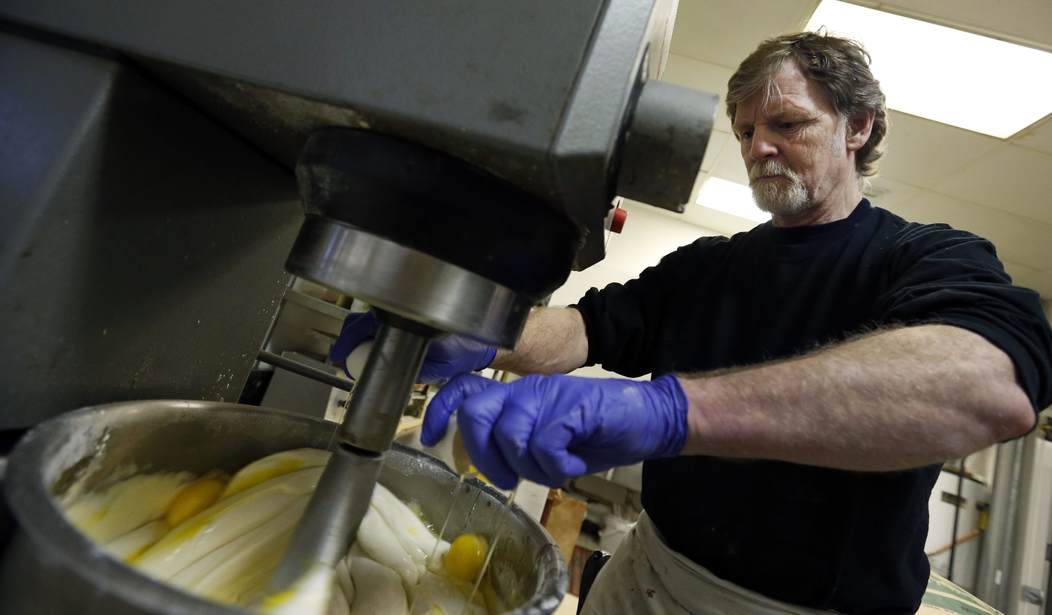In June, the Supreme Court decided the case Masterpiece Cakeshop v. Colorado Civil Rights Commission, issuing a powerful rebuke to the Colorado Civil Rights Commission for its “religious hostility” toward Christian baker Jack Phillips. Phillips had refused to bake a cake for a same-sex wedding, and the commission had compared his decision to religious arguments in favor of the Ku Klux Klan and Nazism.
Now, the commission is again going after Phillips for declining to create a custom cake — this time a cake celebrating transgenderism. On Tuesday night, Alliance Defending Freedom (ADF), the Christian law firm that represented Phillips before the Supreme Court and helped him gain an important 7-2 victory, filed a federal lawsuit against the commission to forestall action against Phillips.
“The state of Colorado is ignoring the message of the U.S. Supreme Court by continuing to single out Jack for punishment and to exhibit hostility toward his religious beliefs,” ADF Senior Vice President of U.S. Legal Division Kristen Waggoner declared in a statement. “Even though Jack serves all customers and simply declines to create custom cakes that express messages or celebrate events in violation of his deeply held beliefs, the government is intent on destroying him—something the Supreme Court has already told it not to do.”
On the very day the Supreme Court decided to hear Masterpiece Cakeshop (June 26, 2017), a caller asked the bakery to make a cake with a pink inside and a blue outside, celebrating a gender transition from male to female. The shop politely declined, but Phillips believes that the same lawyer, on other occasions, requested that he create other custom cakes with messages that violate his faith — a cake celebrating Satan and a cake with Satanic symbols. The lawyer, a man identifying as a woman, goes by the name Autumn Scardina.
Shortly after the Supreme Court gave Jack Phillips his win, denouncing the Colorado Civil Rights Commission for “religious hostility,” the state began to investigate Phillips again, finding probable cause that he had discriminated against the transgender lawyer who Phillips believes placed the call.
The commission had originally ruled that Phillips had discriminated on the basis of sexual orientation against Charlie Craig and Greg Mullins when he refused to craft a cake celebrating their same-sex wedding ceremony in 2012. ADF and Phillips presented two basic arguments: that his free speech rights enabled him to opt out of baking a cake with a message he disagreed with (endorsing a same-sex wedding), and that he was treated unfairly on the basis of his religion.
The Supreme Court granted him a tremendous victory on the second argument, but his case wasn’t decided until 6 years later.
Jack Phillips Opens Up About Being Compared to a Nazi, Though His Dad Liberated a Concentration Camp
To forestall a second round of litigation, ADF filed suit against the commission in federal court. Jeremy Tedesco, ADF’s senior counsel and vice president of U.S. Advocacy and Administration, told PJ Media his firm would “preemptively file a lawsuit in federal court to try to stop what the commission is doing.”
“We think the circumstances are uniquely aligned to do that,” Tedesco explained.
Especially since the Supreme Court ruled that the commission had treated Phillips unfairly on the basis of his religion, thus violating his right to free exercise, this follow-up round seems particularly noxious. “It seems like another round of targeting him and putting him through this very difficult process simply because he wants to be faithful in his business in what he creates through his art,” Tedesco said.
The commission could have decided not to pursue this second case against Phillips. The ADF lawyer explained that, when a Colorado citizen thinks he or she has been discriminated against, they file a complaint with the Civil Rights Division, which then conducts an investigation and determines probable cause.
When Autumn Scardina filed this complaint, Tedesco would have expected the civil rights commission to reject it. “After Masterpiece came down from the Supreme Court, we expected Colorado to take that into account and realize that it was a bad decision to keep targeting Jack for his religious convictions,” the lawyer explained. “Instead, they found probable cause.”
“He’s going to be fully investigated again, there will be hearings from an administrative law judge,” Tedesco said. “It’s restarting the entire scenario.”
“It’s appalling,” the lawyer declared. “It’s unconscionable that they would go after him again right on the heels of losing a case because they were openly hostile to his religious beliefs.”
While the commission — and some liberal Supreme Court justices — argued that Phillips had discriminated against the same-sex couple in 2012 based on their sexual orientation, he constantly argued that he merely wished to opt out of creating a cake to celebrate an event he did not consider a true wedding. This was not the first time Phillips had turned town such cake orders, either. He has always refused to bake any Halloween-themed cakes, which are consistently in demand every October.
Furthermore, when Craig and Mullins requested their cake, Phillips offered to sell them anything else in the store, but they refused. Phillips was not engaging in discrimination against them — he was refusing to bake a cake that would convey a message he disagreed with.
Ironically, the Colorado Civil Rights Commission actually defended another baker who refused to bake a cake that would convey a message. In 2015, the commission declined to take up an appeal involving Azucar Bakery, which refused to bake Bible-shaped cakes with messages against homosexuality. The bakery’s owner, Marjorie Silva, said she refused to bake the cakes because the writing and imagery were “hateful and offensive.”
The very same commission that defended Silva’s free speech rights trampled on Phillips’ free speech rights. This was one major reason why the Supreme Court ruled in favor of Phillips. (The Court was also persuaded by the commission’s outrageously offensive comparison between Phillips’ religious refusal to bake the cake and a defense of Nazism, which was particularly egregious because Phillips’ father fought in World War II and liberated a concentration camp.)
In this later case with Autumn Scardina, Phillips clearly did not reject Scardina on the basis of his gender identity. Instead, the baker refused to bake Satanist cakes and a cake celebrating a gender transition.
In this case, the free speech argument is even stronger, but since the Supreme Court ruled that Colorado had shown “religious hostility” to Phillips before, it stands to reason that ADF should be able to get the federal injunction.
Even if ADF gets the injunction and the commission is prevented from prosecuting Phillips once again, this tragic episode illustrates an important principle about the battle for religious liberty.
“The most common misconception amongst people generally and people who care about religious freedom is that you can win a case and then walk away,” Tedesco, the ADF lawyer, explained. “We always tell our friends that our opposition doesn’t rest. I don’t think there’s any better example of that principle than this same commission taking up essentially the same case against the same man.”
“The Left and progressively-minded commissions like this will never rest,” Tedesco warned. “It’s just a matter of eternal vigilance.”
“If we tire out, if we become weary in defending these things, we will ultimately lose these freedoms for the next generation,” he added, ominously.
Follow the author of this article on Twitter: @Tyler2ONeil.









Join the conversation as a VIP Member